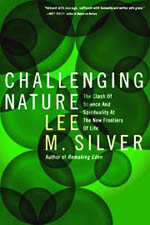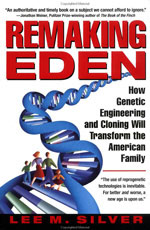|
published by Ecco/Harper Collins, 2006
|
|
Challenging Nature
Previous books
Presentations
Publications/Writings
Biography
Princeton teaching
|
From the Magazine | Medicine
A Quandary That Isn't
Picking a baby's sex won't lead to disaster
Posted Monday, Sep. 21, 1998
Novel approaches to babymaking seem to be coming at us so fast that we hardly have time to digest one before the next one hits--test-tube babies, egg donation, surrogacy, cloning and now sex selection. And just as with earlier methods, the new sperm-separation technique announced last week has triggered plenty of ethical concern. Only a few critics have argued that tampering with nature to avoid a sex-linked genetic disease should be taboo. But plenty have expressed misgivings about using the new technology more casually, to balance families, or simply because parents prefer boys or girls. Such choices, critics say, could lead to an imbalance in the sex ratio, with drastic consequences for society. These arguments are not very persuasive. In some developing countries where boys are more highly valued than girls, sex selection is already standard practice, accomplished by means of infanticide or amniocentesis and abortion. The new sperm-separation technique makes it easier for more people to practice sex selection in these countries.
This could skew the already tilting sex ratio even further in favor of boys. In the short term, such demographic shifts could cause enormous societal problems as men, for example, find it increasingly difficult to find women to marry. In the long term, however, both evolutionary and economic theories tell us that as girls become more scarce, they will become more highly valued, perhaps to the point at which more people will select for girls than against them.
In America and other Western countries there seems to be little chance of the sexes going far out of balance at all. Polls show that a majority of Americans view a perfect family as having one boy and one girl. If everyone used sex selection to achieve perfection, the result would be perfect balance. Of course, some prospective parents do prefer children of one sex or the other. But such preferences would presumably balance out as well.
Regarding the argument that choosing gender goes against nature: the same objection was used in earlier times by people horrified by vaccines or heart transplants, which are now completely acceptable. Every time we use medicine to cure a disease or prevent a death, we go against nature--willingly. Admittedly, sex selection for family balancing cures no disease. In fact, though, no form of babymaking solves a medical problem. Sex selection, moreover, is medically benign in comparison with most reproductive technologies. No surgery is involved, and the entire process can theoretically be performed without a physician. Children born through this process can't be distinguished from other children.
For these reasons, I suspect that as sex selection and other reproductive technologies become more efficient and less costly, they may be embraced by American families of even modest means who ask themselves, Why not? What was once unimaginable could become routine--and the link between the sex act and reproduction will no longer be seen as sacred. Ultimately, this may prove to be the real significance of sex selection: by breaching a powerful psychological barrier, it will pave the way for true designer babies, who could really turn society upside down.
Lee M. Silver, a genetics professor at Princeton, is the author of Remaking Eden: How Genetic Engineering and Cloning Will Transform the American Family.
From the Sep. 21, 1998 issue of TIME magazine
|
Hover over or click on books to order from Amazon.com
|


